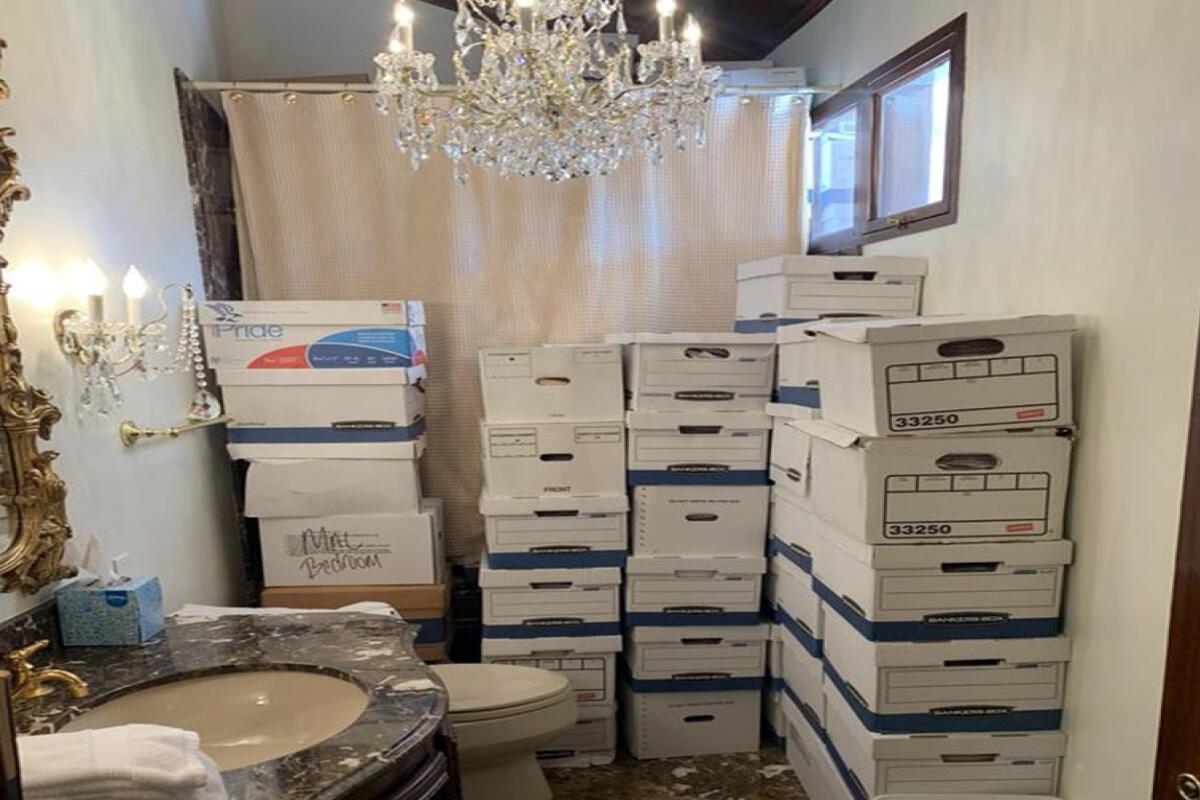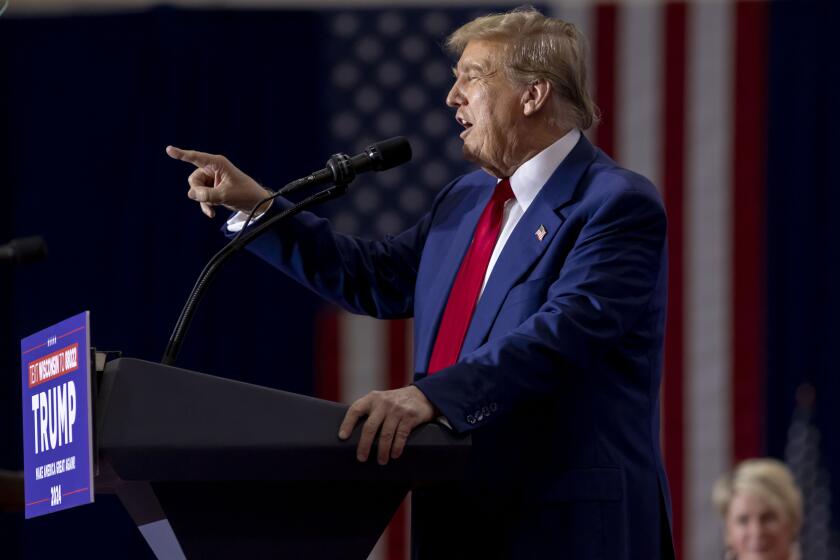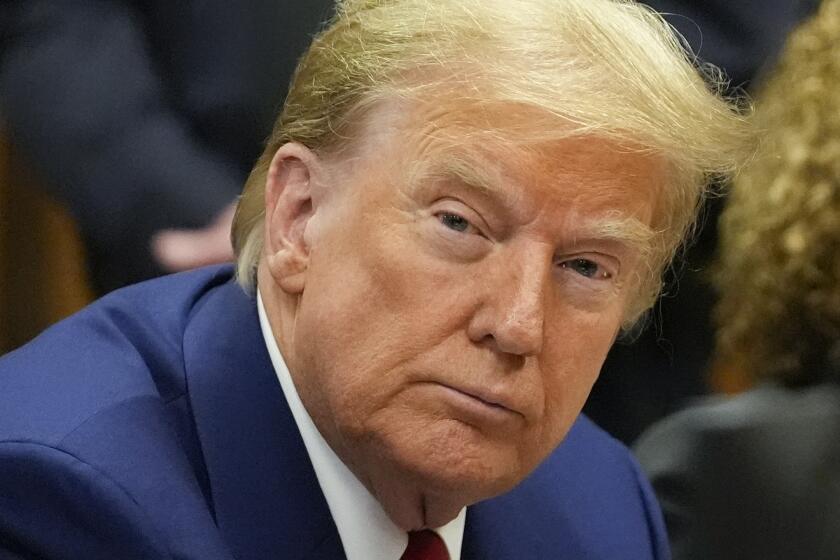Judge rejects Trump latest request to dismiss classified documents prosecution

- Share via
WASHINGTON — A federal judge has refused to throw out the classified documents prosecution against Donald Trump, turning aside defense arguments that a decades-old law permitted the former president to retain the sensitive records after he left office.
Lawyers for Trump had cited a 1978 statute known as the Presidential Records Act in demanding that the case, one of four against the presumptive Republican nominee, be tossed out before trial. That law requires presidents upon leaving office to turn over presidential records to the federal government but permits them to retain purely personal papers.
Prosecutors on special counsel Jack Smith’s team countered that that law had no relevance to a case concerning the mishandling of classified documents and said the records Trump is alleged to have hoarded at his Mar-a-Lago estate and resort were unquestionably presidential records, not personal files, and therefore had to be returned to the government when Trump left the White House in January 2021.
U.S. District Judge Aileen Cannon, who heard arguments on the matter last month, on Thursday permitted the case to proceed in a three-page order that rejected the Trump team claims.
She wrote that the 40-count indictment against Trump makes “no reference to the Presidential Records Act” nor does it “rely on that statute for purposes of stating an offense.”
California Democratic Reps. Zoe Lofgren, Adam B. Schiff and Pete Aguilar are among those who believe they could be targeted for retribution if Trump is reelected.
The ruling represents a modest win for Smith’s team, which has been trying to push the prosecution forward to trial this year while also expressing growing frustration, including earlier this week, with Cannon’s oversight of the case. Other Trump motions to dismiss the indictment remain unresolved by the judge, the trial date is in flux, and additional legal disputes have slowed the progress of the case.
In Thursday’s ruling, Cannon also defended an order from last month that asked lawyers for both sides to formulate potential jury instructions and to respond to two different scenarios in which she appeared to be continuing to entertain Trump’s presidential records argument.
The order drew a sharp rebuke from Smith’s team, with prosecutors in a filing this week calling the premises she laid out “fundamentally flawed” and warning that they were prepared to appeal if she pushed ahead with jury instructions that they considered wrong.
Federal prosecutors are scolding the judge presiding over former President Trump’s classified documents case in Florida.
“The Court’s order soliciting preliminary draft instructions on certain counts should not be misconstrued as declaring a final definition on any essential element or asserted defense in this case,” Cannon wrote. “Nor should it be interpreted as anything other than what it was: a genuine attempt, in the context of the upcoming trial, to better understand the parties’ competing positions and the questions to be submitted to the jury in this complex case of first impression.”
The ruling Thursday was the second time in as many months that the judge denied one of Trump’s motions to drop the case. In March, she spurned an argument that the statute underpinning the bulk of the charges was unconstitutionally vague and therefore required the dismissal of the indictment.
A federal judge rejected Trump’s bid to dismiss his classified documents case after his lawyers argued it trampled on the former president’s rights.
Cannon has yet to rule on other Trump efforts to dismiss the case, including arguments that presidential immunity shields him from prosecution and that he has been subject to “selective and vindictive prosecution.”
Trump is facing dozens of felony counts related to the mishandling of classified documents, according to an indictment alleging he improperly shared a Pentagon “plan of attack” and a classified map related to a military operation.
The case was initially set for trial on May 20, but Cannon heard arguments last month on a new date without immediately setting one. Both sides have said they could be ready for trial this summer, though defense lawyers have said Trump should not be forced to stand trial while the election is pending.
Smith’s team has separately charged Trump with plotting to overturn the results of the 2020 presidential election, a case delayed by a Supreme Court review of his arguments that he is immune from federal prosecution. Prosecutors in Fulton County, Ga., have also charged Trump with trying to subvert that state’s election, though it remains unclear when that case will reach trial.
Jury selection is set for April 15 in Trump’s hush money criminal trial in New York.
A New York judge, brushing aside defense attorneys’ arguments, sets an April 15 date for former President Trump’s hush money case.
That case centers on allegations that Trump falsified his company’s internal records to hide the true nature of payments to his former lawyer Michael Cohen, who helped Trump bury negative stories during his 2016 presidential campaign. Among other things, Cohen paid porn actor Stormy Daniels $130,000 to suppress her claims of an extramarital sexual encounter with Trump years earlier.
Trump has pleaded not guilty and denied having a sexual encounter.
Tucker writes for the Associated Press. AP writer Alanna Durkin Richer contributed to this report.
More to Read
Sign up for Essential California
The most important California stories and recommendations in your inbox every morning.
You may occasionally receive promotional content from the Los Angeles Times.














